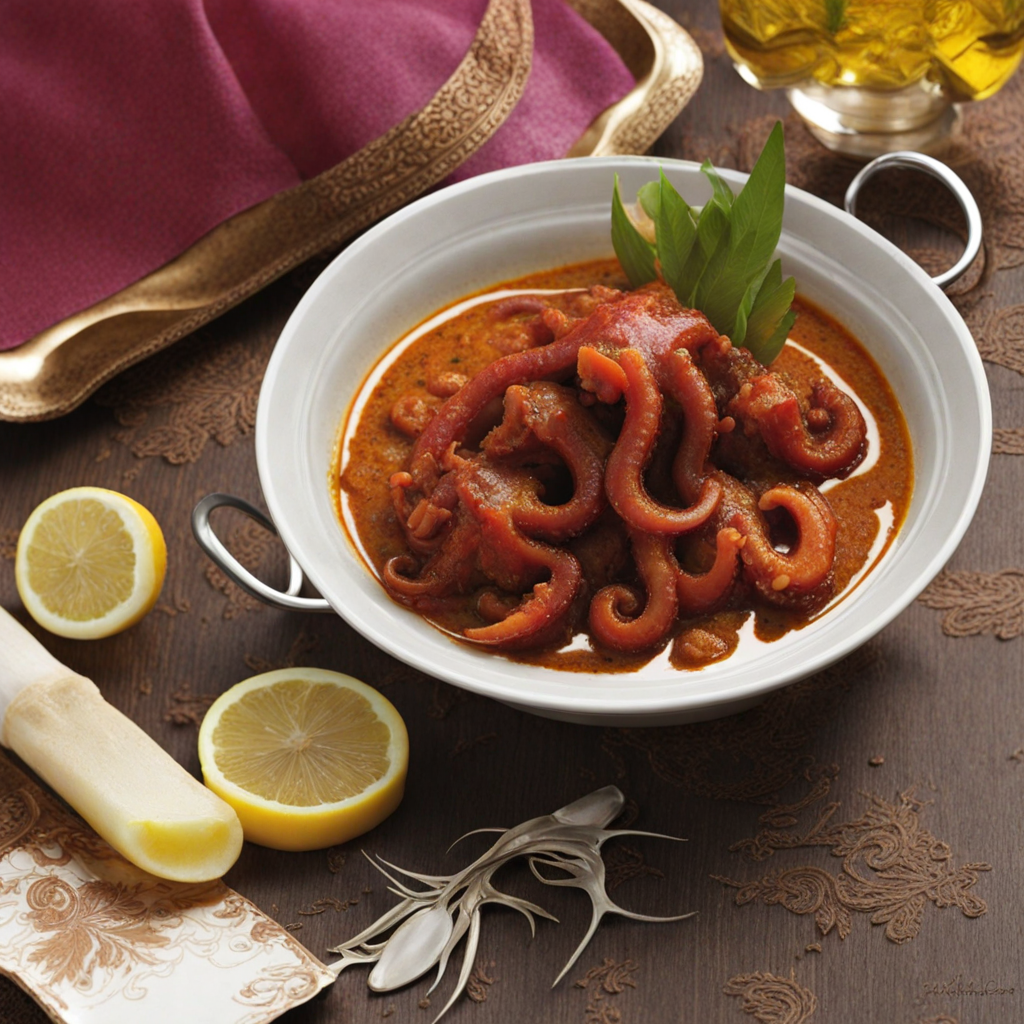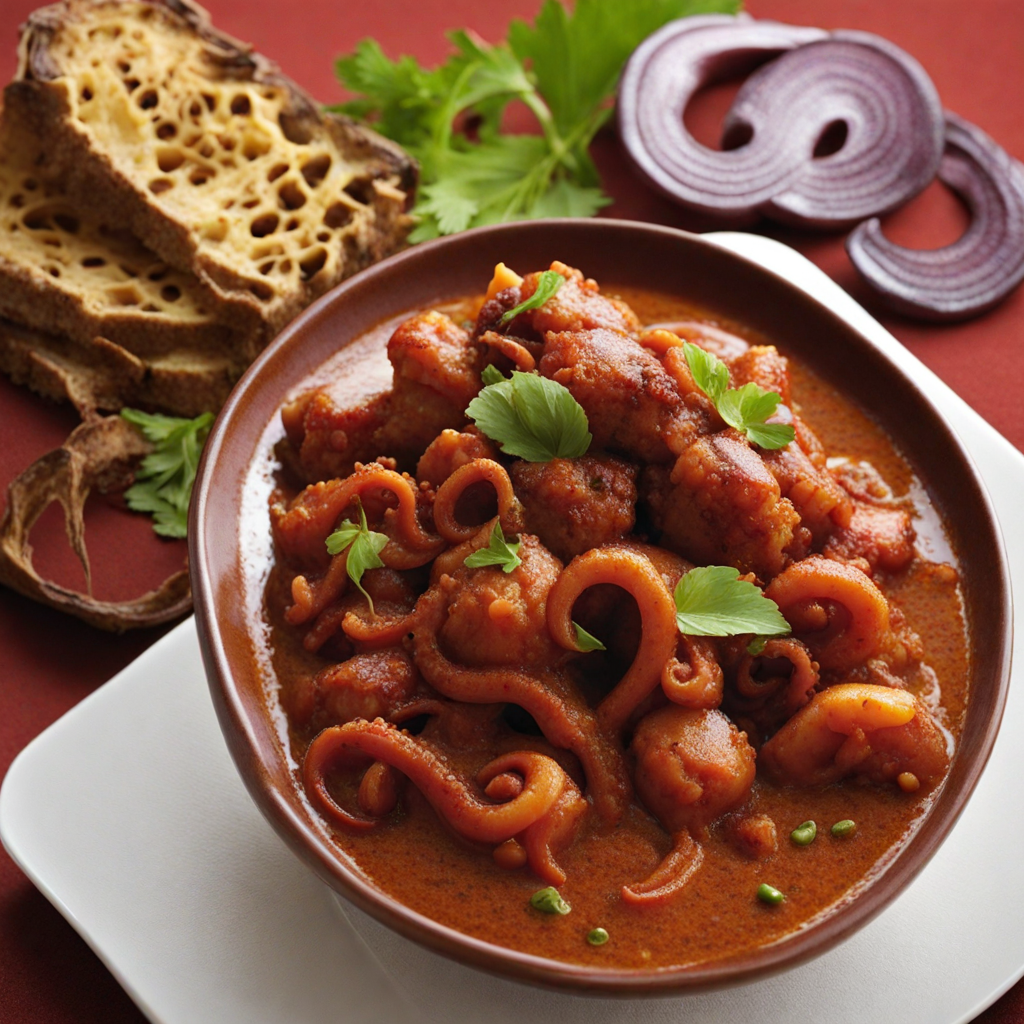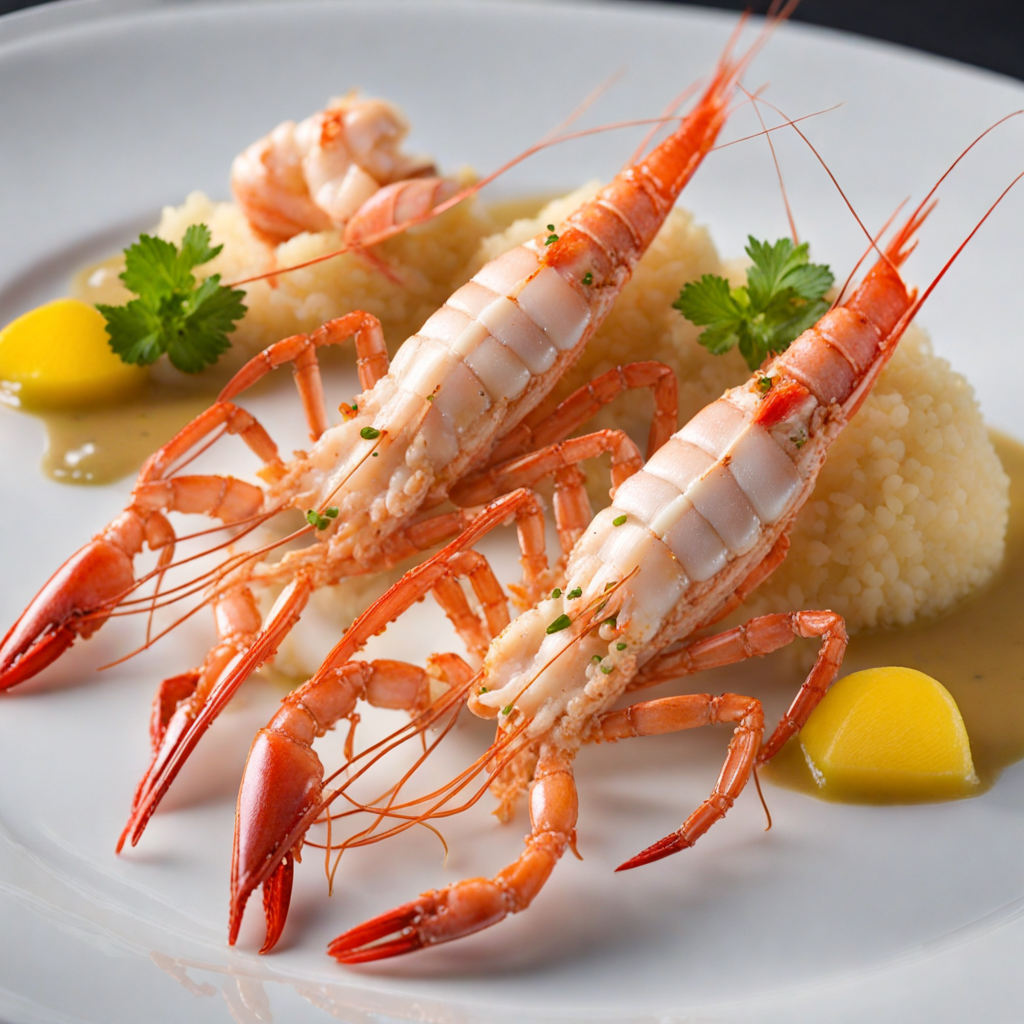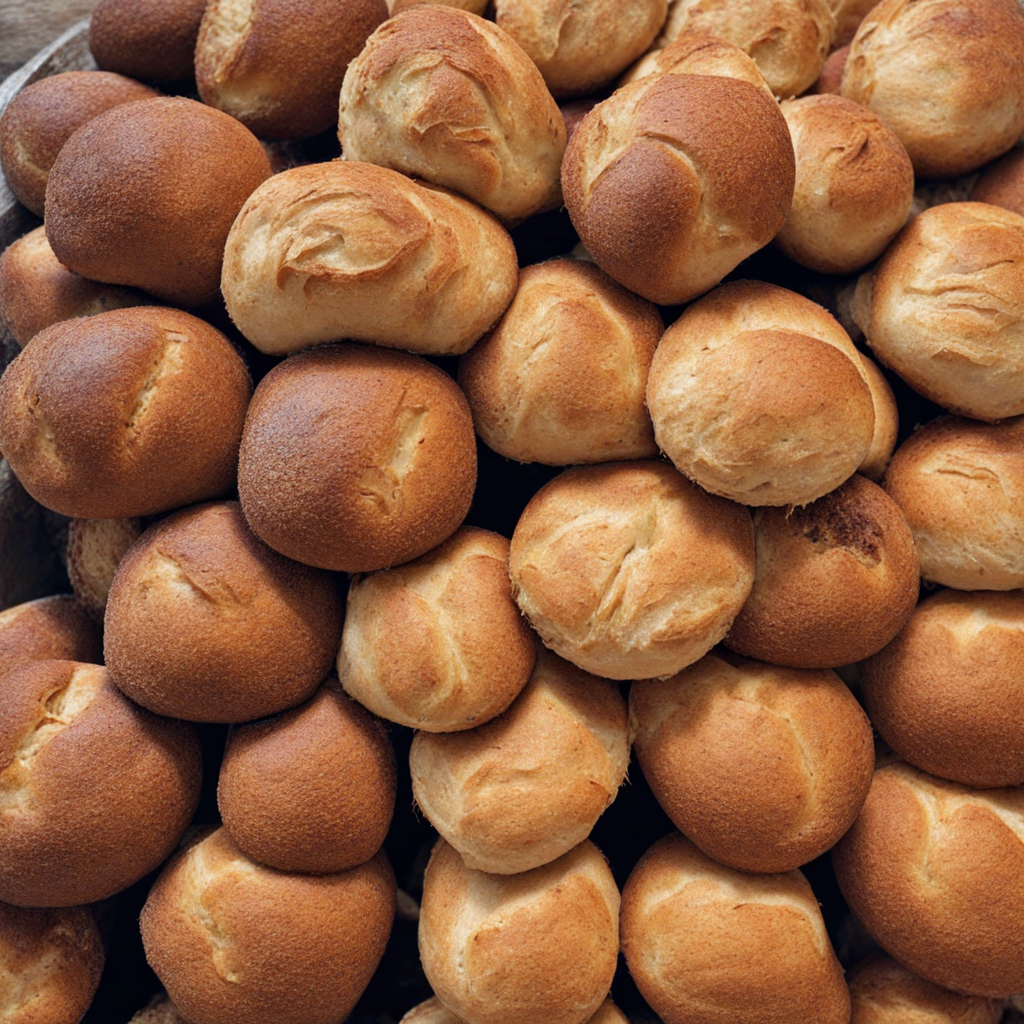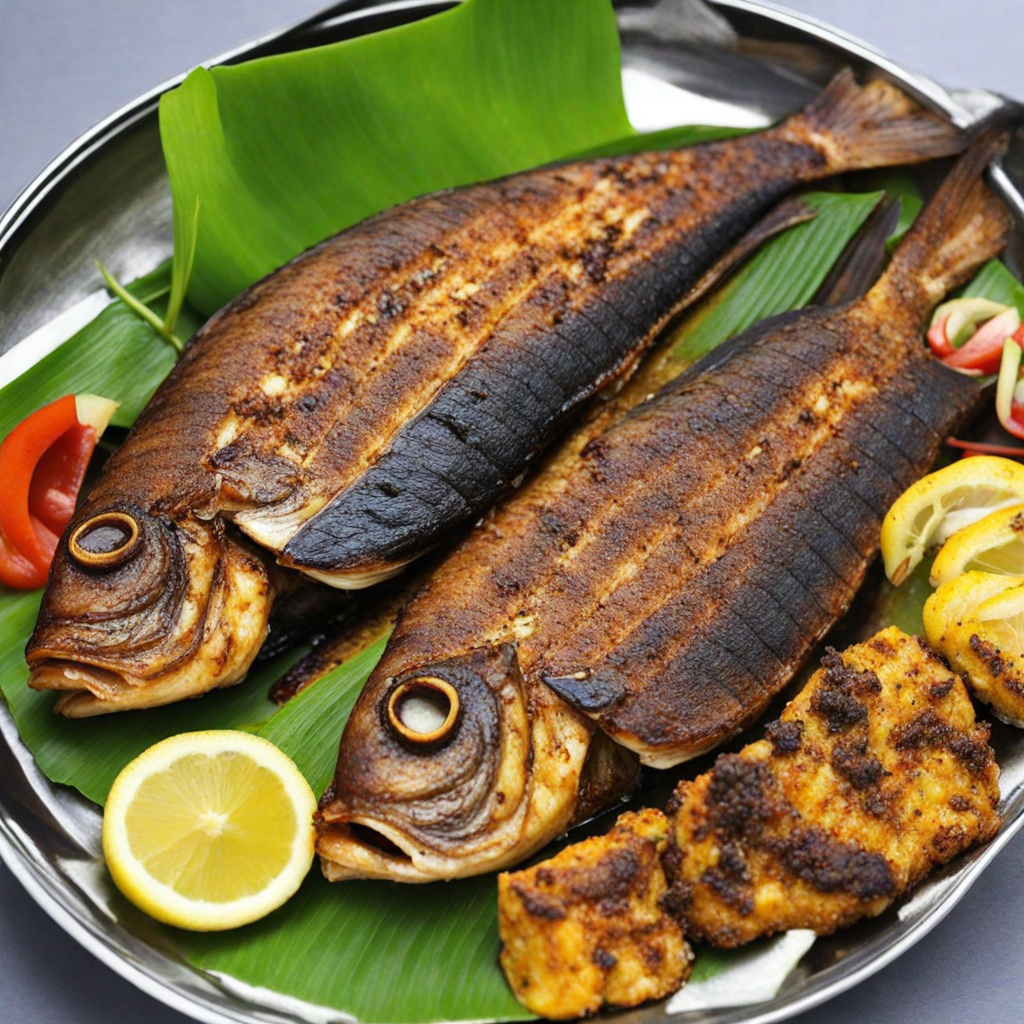Octopus Curry
Octopus Curry from Comoros is a vibrant and aromatic dish that beautifully encapsulates the essence of the islands' rich culinary heritage. This dish features tender, succulent pieces of octopus, which are delicately simmered to achieve a melt-in-your-mouth texture. The octopus is often marinated in a blend of local spices, such as turmeric, ginger, and garlic, allowing the flavors to penetrate deeply into the meat. The curry is typically brightened with fresh ingredients like tomatoes, onions, and coconut milk, creating a luscious sauce that perfectly complements the seafood. The dish is enhanced by the use of local herbs and spices, which contribute to its unique flavor profile. The sweetness of the coconut milk balances the spices, resulting in a curry that is both rich and refreshing. Often, you’ll find hints of lime or lemon juice added to provide a zesty kick, elevating the overall taste experience. Served over a bed of fragrant rice or with traditional bread, Octopus Curry becomes a hearty meal that is both satisfying and indulgent. In Comorian culture, sharing a meal is a significant aspect of community and family life, and Octopus Curry is often enjoyed during special gatherings and celebrations. Its preparation is a labor of love, as families come together to create this dish, showcasing the importance of culinary traditions in preserving their unique identity. With each bite, you’re not just tasting a dish; you’re experiencing the warmth and hospitality of the Comorian people, making Octopus Curry a true gastronomic delight worth exploring.
How It Became This Dish
Cari de Poulpe: A Culinary Journey through the Comoros Islands Nestled in the azure waters of the Indian Ocean lies the Comoros archipelago, an enchanting collection of islands where the rich tapestry of culture, history, and cuisine converge. Among the culinary gems of this tropical paradise is "Cari de Poulpe" (Octopus Curry), a dish that encapsulates the essence of Comorian identity, blending local flavors, historical influences, and cultural significance. Origins of Cari de Poulpe The Comoros Islands, comprising Grande Comore, Mohéli, Anjouan, and Mayotte, have been shaped by centuries of migration, trade, and cultural exchange. The islands' strategic location along maritime trade routes brought a melange of influences from Africa, the Middle East, and Asia, which is reflected in the local cuisine. It is believed that the introduction of octopus to the Comorian diet dates back to the early interactions with Arab traders, who brought with them not only spices and cooking techniques but also a deep appreciation for seafood. Octopus, abundant in the surrounding waters, quickly became a staple among the islanders. Its versatility and rich flavor made it an ideal candidate for various preparations, but the rise of Cari de Poulpe as a beloved dish can be traced to the growing influence of Indian and Swahili culinary traditions. The use of spices, coconut milk, and a variety of local herbs and vegetables made Cari de Poulpe a unique representation of Comorian culture. Ingredients and Preparation Cari de Poulpe is a delightful amalgamation of local ingredients and flavors. The primary component, octopus, is often caught fresh by local fishermen. The dish typically features tomatoes, onions, garlic, ginger, and a vibrant array of spices, including turmeric, coriander, and sometimes chili for a hint of heat. Coconut milk, a staple in the region, adds a creamy richness that balances the spices beautifully. To prepare Cari de Poulpe, the octopus is cleaned and cut into pieces, then marinated with a blend of spices to enhance its flavor. The base is created by sautéing onions, garlic, and ginger in oil, followed by the addition of chopped tomatoes. Once the mixture is fragrant, the marinated octopus is added, cooking gently to allow the flavors to meld. Finally, coconut milk is stirred in, and the dish is simmered until the octopus is tender and infused with the aromatic sauce. This dish is often served with rice or cassava, which helps to soak up the delicious curry sauce, making it a comforting and satisfying meal. Cultural Significance Cari de Poulpe is more than just a dish; it is a cultural emblem that speaks to the heart of Comorian life. Food in the Comoros is deeply intertwined with social practices, family gatherings, and celebrations. It is customary for families to come together to prepare and enjoy meals, fostering a sense of community and connection. Cari de Poulpe is often served during special occasions, such as weddings, religious festivals, and communal feasts, where it symbolizes abundance and hospitality. The dish also serves as a reminder of the resilience of Comorian culture amid external influences. While the islands have faced challenges, including colonialism and economic fluctuations, their culinary traditions have remained a source of pride and identity. Cari de Poulpe, with its rich flavors and vibrant presentation, reflects the ingenuity of the Comorian people, who have adapted and evolved their culinary practices over generations. Development Over Time The evolution of Cari de Poulpe can be traced through the changing social and economic landscape of the Comoros. In recent decades, as the islands have become more integrated into global trade networks and tourism has increased, the culinary scene has also transformed. Chefs and home cooks alike have experimented with traditional recipes, incorporating new elements while honoring the foundational aspects of the dish. The rise of tourism has brought international attention to Comorian cuisine, leading to a renewed interest in local dishes like Cari de Poulpe. Restaurants and food festivals now showcase this beloved curry, often placing it alongside other signature dishes from the islands. This has not only helped to preserve traditional recipes but also allowed for a fusion of flavors, as chefs blend Comorian ingredients with other culinary influences. Moreover, the global rise in awareness about sustainable seafood practices has prompted a focus on responsible fishing methods in the Comoros. Local fishermen are increasingly adopting environmentally friendly practices, ensuring that the octopus caught for Cari de Poulpe is sourced sustainably. This not only benefits the marine ecosystem but also enhances the quality of the dish, as fresh, ethically sourced octopus is essential for creating an authentic culinary experience. Conclusion Cari de Poulpe is a quintessential representation of Comorian culture, encapsulating the islands' history, resilience, and culinary artistry. This dish, rich in flavor and steeped in tradition, serves as a bridge between past and present, connecting generations of Comorians through the simple act of sharing a meal. As the Comoros continues to navigate the complexities of globalization and cultural exchange, Cari de Poulpe stands as a testament to the enduring spirit of its people. It reminds us that food is not merely sustenance; it is a powerful expression of identity, community, and the rich narratives that shape our lives. Whether enjoyed in a family home or a bustling restaurant, Cari de Poulpe invites all who partake in its warmth to experience the vibrant soul of the Comoros Islands.
You may like
Discover local flavors from Comoros


